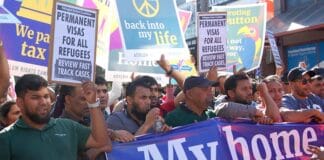The far right Alternative for Deutschland (AfD) won 14.2 per cent of the vote in September’s elections to enter Berlin’s state parliament for the first time.
Mayor of Berlin, Michael Muller stated that if the AfD received even one tenth of the votes it would be seen around the world as a sign of the return of the extreme right-wing and the Nazis in Germany.
It has now gained representation in ten of 16 German state parliaments, becoming the second or third most popular party in three regions.
So how did the AfD—a right-wing populist and Eurosceptic party that formed three years ago, win such support? The growth in Islamophobia and a backlash against refugees has provided the AfD a platform to blame Germany’s welcome to refugees for a series of crimes and terrorist attacks.
The AfD has even beaten the mainstream right-wing Christian Democratic Union (CDU). President Angela Merkel’s CDU originally campaigned for the support of the intake of refugees from Syria, proudly announcing “We will manage!” as one million refugees arrived in Germany last year.
Now Merkel is back pedalling, giving into the chauvinistic rhetoric of the AfD as a means to win back public trust. Earlier in September while attending the G20 summit she commented, “The topic of integration will still play a big role, and the question of how to return refugees who are not entitled stay.”
The far right in Germany is attempting to take advantage of discontent as a result of the economic crisis and take it in a racist direction. Last year Pegida, a neo-Nazi group, held a series of street rallies. They were beaten back by counter-protests including a 30,000 strong anti-fascist rally.
An anti-racist rally in early September this year drew together 6000 people including Blockupy (anti-austerity) supporters, trade unionists, workers, students and youth organisations. Protests and opposition to racist policies must continue. In the imminent future fighting Islamophobia is crucial to building solidarity in order to overcome the racist backlash against refugees.
By Tooba Anwar





